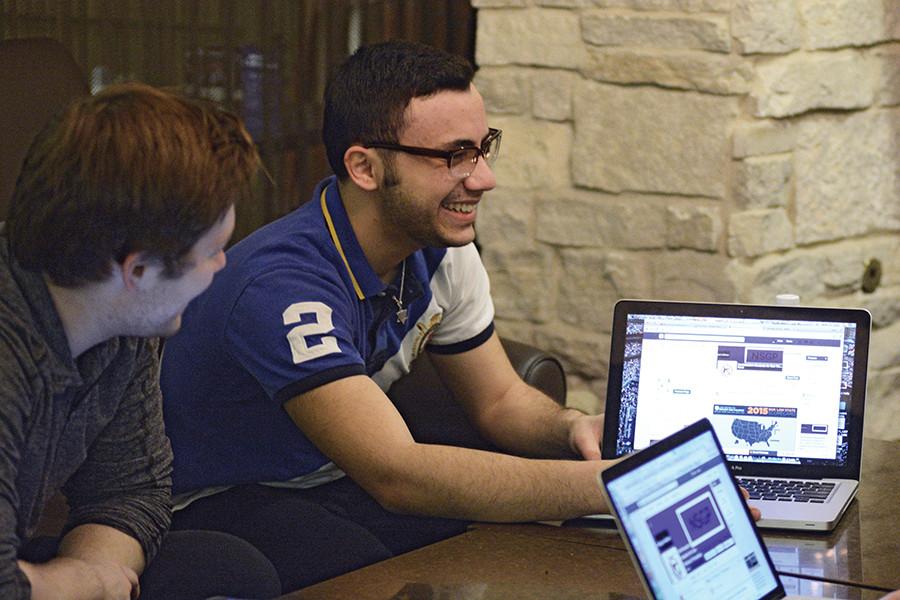Students for Gun Violence Prevention seeks official student group status
Zack Laurence/The Daily Northwestern
Weinberg junior Aitan Licht co-leads a meeting with members of his group, Northwestern Students for Gun Violence Prevention, in the Willard Residential College dining hall. The group, founded in 2014 as an offshoot of College Democrats, will hear back this week about receiving official status from the University.
February 7, 2016
Division of Student Affairs this week may award official status to a two-year-old group geared toward ending the “plague of gun violence” across the U.S. by providing local volunteer opportunities, facilitating discussion and bringing in speakers, the group’s leaders said.
Co-run by Weinberg juniors Clare Fisher and Aitan Licht, Northwestern Students for Gun Violence Prevention began meeting in 2014 as an offshoot of College Democrats, but recently ramped up its recruitment efforts through a new Facebook page. If Student Affairs approves their request for official status, the group can apply for funding from Associated Student Government.
“When I moved here my freshman year, I was really surprised to hear about how horrible gun violence is on the South Side (of Chicago) and how many people are dying,” Fisher said. “It’s getting worse and not improving. There’s a perpetual cycle that happens within communities where violence is prevalent and nothing is being done to stop it.”
Fisher, who grew up in Boston, said she first learned about these issues by working for former Boston mayor Thomas Menino, who co-founded the national coalition Mayors Against Illegal Guns. Since then, she has worked with the Illinois Council Against Handgun Violence to display art in Norris University Center and also hosted a “teach-in” to spread awareness about the issues.
Gun violence in Chicago reached a three-year peak in 2015 with nearly 470 homicides and more than 2,900 people shot, according to the Chicago Tribune.
In January, President Barack Obama took executive action to stem the tide of gun access in the U.S., reiterating his former positions, which include comprehensive background checks and hiring more Bureau of Alcohol, Tobacco, Firearms and Explosives agents to expedite the background review process before people are able to purchase guns.
“People have called Barack Obama the best firearm salesman,” Licht said. “People think that whenever there’s any attempt at institutional response to gun violence in this country, he’s going to take their guns away. Personally, I just don’t believe people should have guns at all.”
According to its website, Student Affairs determines whether to recognize a student group based on whether it supports the University’s educational mission, has a committed group of student members and has a plan to ensure the organization’s sustainability for at least three years, among other criteria.
As of now, the group has about 10 members, but both leaders said they hope to expand upon receiving official status. In the future, Fisher said she hopes to branch out into the Evanston community through service events and educational sessions.
Evanston police have sought to curb violence through local buy back programs with limited success. In November 2012, officials announced the first amnesty-based gun buyback which resulted in 45 collected firearms. Since then, police have opened the program up on an ongoing basis.
“America has to put aside its gun fetish and recognize the obsession with guns in many right-wing communities in this country,” Licht said. “They’re indirectly and/or directly responsible for violence that occurs every single day.”
If University officials recognize the group, they can apply for funding through ASG, said ASG B-status finances vice president Kenny Mok, whose committee determines funding for smaller groups that generally receive a few hundred dollars from ASG quarterly.
The Weinberg senior said groups should have no trouble receiving funding if they have a clear plan and solid membership.
Email: [email protected]
Twitter: @davidpkfishman


